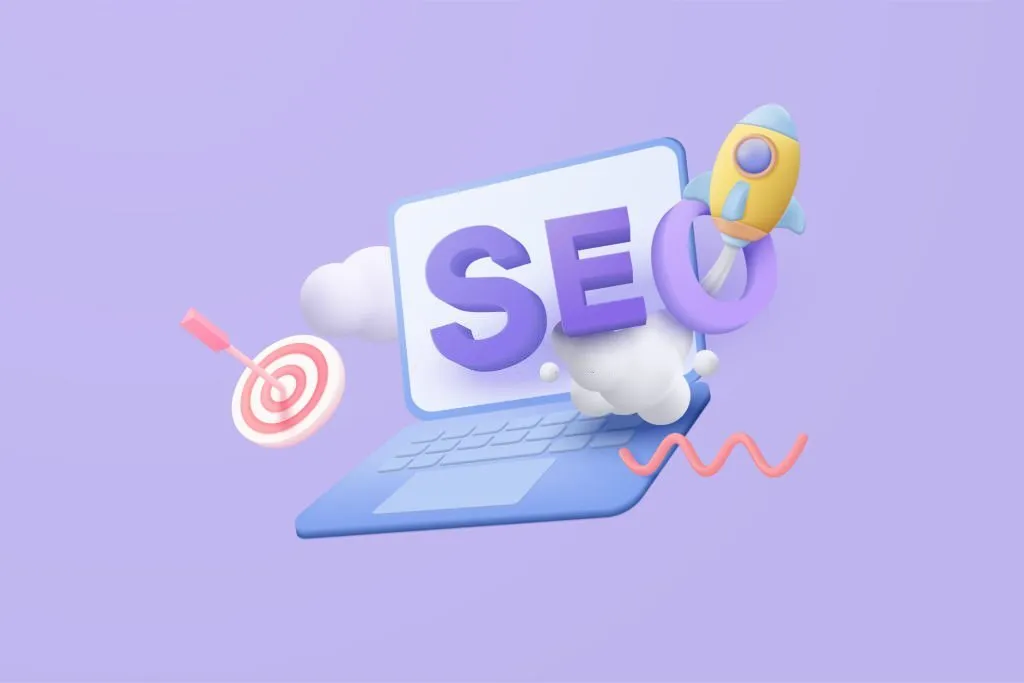In today’s digital age, the world feels like it’s right at our fingertips. From ordering a meal to researching a topic or connecting with friends across the globe, we turn to the internet for almost everything.
And guess what? Search engines, like Google and Bing, play the role of our trusted guides, helping us navigate this vast digital landscape.
Think about it: How often do you go past the first page of search results when you’re looking for something? Rarely, right? That’s why being on that coveted first page is so crucial. It’s like being in the spotlight on a grand stage.
In this article, I’ll take you through the magic behind the art and science of Search Engine Optimization (SEO). And more importantly, I’ll share why it’s a game-changer for anyone wanting to leave a mark online.
From Digital Chaos to Organized Search
It’s evident that in our current digital landscape, being discovered online has never been more vital. Imagine this: for every individual on this planet, there’s almost an equivalent number of websites out there!
Cutting through this vast online clutter is no easy feat. Making it to the top, particularly that coveted first page of search results, is a challenge.
But here’s a fact: Most of our online journeys start with a search. A study by BrightEdge found that 68% of online experiences kick off with a search engine. Furthermore, organic search accounts for over half (53%) of all website traffic.
If we dive deeper into the world of search engines, a staggering 93% of global online traffic flows through Google, encompassing searches on its main platform, Google Images, and even Google Maps, as stated by Sparktoro.
To truly grasp the significance of search, let’s embark on a little imaginative journey into how the Internet functions.
You may find it difficult to understand at first, but make sure you read to the end, as everything will start to make sense, gradually.
How the Internet Functions
Picture the Internet as a sprawling city. In this city, houses represent websites. Each distinct room inside these houses corresponds to different web pages on that site, and what about the passageways connecting these rooms?
They symbolize internal links. As the number of houses (or websites) multiplies, our town transforms into a bustling city.
Now, the roads weaving through this city? They resemble external links, connecting various houses and neighborhoods. Consider a highly frequented website like a buzzing shopping mall with numerous routes and even highways directing traffic it’s way.
When you’re aware of a building’s address, reaching it is straightforward, much like punching in a website’s URL. However, without that address, you’d rely on clues or directories to guide you. This process is somewhat akin to using a search engine.
This analogy simplifies how the internet functions, given its intricate nature. Yet, it does paint a picture of how websites interact and highlights the pivotal role of search engines.
Recall the Internet’s early days? Accessing a website was a tedious task, often requiring you to input its exact address or access it via a link from another site.
But with the proliferation of websites, search engines emerged as beacons, guiding users effortlessly through the vast web.
And among these search engines, while names like Yahoo and Bing ring familiar, it’s Google that dominates, accounting for a whopping 90% of global search queries, as sourced from Oberlo. This prominence of search engines gave birth to the very art of SEO.
Definition of SEO
Have you ever wondered how certain websites always seem to pop up first when you type something into Google? Or why are some pages buried deep down, never seeing the light of the digital day?
Well, that’s where SEO steps in.
What is SEO?
Search Engine Optimization (SEO) is the practice of improving a website to make it more visible on search engines like Google.
It’s like giving your website a digital megaphone, ensuring it speaks loudly and clearly in the bustling online marketplace.
Think of SEO as the behind-the-scenes magic that gives some websites their spotlight moment.
Search Engine Optimization (SEO) is the practice of refining a website to enhance its visibility on search engines like Google.
Breaking Down SEO
When it comes to SEO, it’s not just a one-size-fits-all approach. Instead, it’s a harmonious blend of various tactics and strategies, much like crafting a perfect melody with different musical notes. Let’s unpack the core components:
On-Page SEO:
Imagine you’re hosting a party. On-page SEO is all about ensuring that everything inside your house is in top-notch condition for your guests.
It’s about fine-tuning the content on your website and the underlying HTML source code. This includes making sure your content is relevant, using the right keywords, and structuring it in a way that search engines and readers love.
Off-Page SEO
Now, think about your reputation in the larger community. Off-page SEO is akin to building a good name for yourself in the digital neighborhood.
It focuses on external factors, with backlinks being a prime example. Backlinks are essentially “votes of confidence” from other websites, signaling to search engines that your site is trustworthy and valuable.
Technical SEO
Back to our party analogy; this is about ensuring the map to your house is clear, and the entrance is easily accessible. In the digital realm, Technical SEO ensures search engines can smoothly crawl and index your website.
It delves deep into the backend, optimizing site speed, ensuring mobile-friendliness, and making certain that search engines can understand your site’s structure.
Together, these three pillars hold up the mighty structure of SEO, ensuring your website stands tall and visible amidst the vast digital landscape.
Importance of SEO
Sometimes, I liken the digital world to a bustling city marketplace. Amidst the myriad of stalls, there are those that constantly draw crowds, while others seem to be overlooked.
What makes the difference? In the online realm, it’s SEO. Let’s explore why SEO is more than just a digital strategy, it’s the lifeblood of your online presence.
1. Visibility and Branding:
Picture this: someone’s searching online for the very product or service you offer. Wouldn’t you want to be their go-to option, popping up every time they search related terms?
With effective SEO, you become a recurring presence, imprinting your brand in their minds. It’s not just about that one-time sale; it’s about becoming their first thought time and again.
2. Credibility and Trust:
Ever noticed how we tend to trust the first few results on Google instinctively? There’s a subconscious belief that sites ranking higher are more credible. By securing a top spot, you’re not just capturing clicks, you’re earning trust.
3. Website Traffic:
While not all traffic might convert into sales, consistent organic traffic lays the foundation. Think of it as inviting potential customers into your store.
Some may just browse, but many could end up making purchases. And the best part? This influx from organic search doesn’t cost per click!
4. ROI and Cost Effectiveness:
Here’s a reality: traditional ads can be expensive, and their impact fades once the campaign ends. SEO, on the other hand, is the gift that keeps on giving.
Although it may require an initial investment, especially if you’re hiring experts, the organic traffic and visibility you gain continue over time. It’s like planting a tree and reaping its fruits year after year.
5. Staying Competitive:
Remember, if you’re contemplating the significance of SEO, your competitors probably are too. In fact, they might already be optimizing, trying to claim that top spot.
To stay in the game, and better yet, to lead it, SEO isn’t just an option, it’s a necessity.
To put it simply, SEO is the compass that guides potential customers to your digital doorstep. Without it, even the best products or content could remain hidden in the vast expanse of the internet.
Evolution of SEO

When I think back to the early days of SEO, it feels almost like recalling the wild west of the digital realm. It was uncharted and a bit chaotic, and there were certainly no concrete rules.
Let’s take a stroll down memory lane, observing how SEO has matured from its naive infancy to the nuanced science and art it is today.
The Dawn of SEO:
In the 1990s, as search engines began to grow, so did understanding of their potential for businesses. However, with limited algorithms in place, early SEO was mostly about stuffing keywords into web pages, often to a point where the content barely made sense.
Imagine reading a page where every other sentence was, “Buy the best shoes here because these are the best shoes you’ll find if you’re looking for the best shoes.” Clumsy, right? But back then, that worked!
Search Engines Fight Back:
As search engines, notably Google, began to understand the tactics websites were using, they started refining their algorithms.
The focus shifted from sheer keyword volume to the relevance and quality of the content. Sites practicing deceptive tactics, like hidden text or cloaking, faced penalties.
This marked the beginning of an ongoing game of cat and mouse between search engines and SEOs trying to outsmart them.
Rise of Quality Content and User Experience:
As the 2000s progressed, search engines placed increasing emphasis on the user experience. It wasn’t just about keywords anymore; factors like website loading speed, mobile optimization, and user-friendly design came into play.
Content marketing became the buzzword, with the idea that quality content would naturally attract backlinks and drive traffic.
Sophistication and Personalization:
With advancements in technology and data collection, search results began to be tailored to individual users. Personal search histories, location data, and browsing habits started to influence what users saw on their search result pages.
SEO had to become more sophisticated, thinking not just about keywords but also about intent, user experience, and the broader content landscape.
Today’s SEO Landscape:
Now, as we navigate through the 2020s, SEO is multifaceted. Voice search optimization, AI-driven algorithms, and an even greater emphasis on user intent shape the field.
The focus isn’t just on getting to the top of the search results, but ensuring that once users click, they find exactly what they’re looking for.
Looking back, it’s remarkable to see how SEO has evolved from a simplistic, almost mechanical process to a complex discipline that requires a deep understanding of both technology and human behavior.
It’s a testament to how dynamic the digital world is, and for someone like me, that’s what makes it endlessly fascinating.
Common Misconceptions of SEO

Venturing into the world of SEO can sometimes feel like stepping into an old, mysterious forest filled with tales, legends, and a few myths.
Over the years, as I’ve delved deeper into the SEO realm, I’ve come across numerous misconceptions that have misled many. Today, I’d like to shine a light on some of these myths, dispelling the shadows and offering clarity.
1. “SEO is a one-time task”:
Oh, how I wish this were true! It would make things so much simpler. But the reality is, that SEO is a continuous effort. Search engines regularly update their algorithms, user behavior shifts, and the online competitive landscape keeps changing.
Imagine tending a garden; you can’t just plant flowers once and expect them to bloom forever. They need regular care and attention.
2. “It’s all about the keywords”:
If SEO were a movie, keywords would probably get the lead role, but they’re not the only cast members. While keywords are undeniably important, modern SEO goes way beyond them.
User intent, content quality, user experience, technical factors, and backlinks play crucial roles. Over-obsessing about keywords, especially to the detriment of readability or user experience, can be counterproductive.
3. “More backlinks always mean better rankings”:
The quality of your friends matters more than their quantity, and the same goes for backlinks. While having numerous sites linked to yours might sound appealing, what really matters is the relevance and quality of those links.
A handful of backlinks from reputable, related sites can be more impactful than dozens from low-quality or unrelated sources.
4. “SEO results are instantaneous”:
In our age of instant gratification, it’s easy to fall for this misconception. However, SEO is more of a marathon than a sprint.
While some tactics might yield quicker results, building genuine authority and relevance in the eyes of search engines takes time and consistent effort.
5. “Once I rank #1, my job is done”:
Achieving that coveted #1 spot is indeed a significant milestone. But resting on your laurels can be risky. Competitors are always vying for that position, and search engine criteria can change.
Continuous optimization, content updates, and staying abreast of the latest SEO trends are essential to maintaining or improving rankings.
As I’ve journeyed through the vast world of SEO, these myths have often reminded me of mirages, seemingly real but deceptive upon closer inspection.
The key is to equip oneself with knowledge, stay updated, and approach SEO with a blend of patience, strategy, and adaptability.
What is SEO, and Why Does it Matter?
As we meander back from our explorative journey through the realm of SEO, I can’t help but reflect on its profound significance in our digital age.
The way we search, shop, learn, and connect has undergone a sea change in the past decades, and at the heart of this evolution lies SEO. It’s the silent force that ensures the right information meets the right eyes at the right moment.
If you remember just one thing from our time together in this article, let it be this: SEO isn’t just about rankings or keywords. It’s about understanding and connecting with people. It’s about ensuring that your voice, your product, and your story are heard in an ever-growing sea of digital content.
Yet, as we’ve scratched only the surface of this vast domain, I encourage you; no, I challenge you to delve deeper. Each component of SEO, be it on-page elements, technical intricacies, or off-page strategies, holds a universe of knowledge within it.
As you dive into these specifics, you’ll begin to truly appreciate the immense impact and potential that SEO carries.
The digital age is here to stay, and SEO is its cornerstone. Embrace it, learn from it, and let it propel you to digital success.
After all, in the words of Alvin Toffler,
“The illiterate of the 21st century will not be those who cannot read and write, but those who cannot learn, unlearn, and relearn.”
Alvin Toffler
So, keep that thirst for knowledge alive and continue your SEO odyssey!
Let’s Continue This Journey Together!
If you’ve made it this far, first off, a big thank you for sharing this journey with me! But as we’ve noted, the realm of SEO is vast, and there’s so much more to explore. I’m eager to continue delving deeper into this fascinating world with you.
Do you have any lingering questions or thoughts sparked by our discussion? Please drop them in the comments below. Your insights, curiosities, and experiences will not only enrich our collective understanding but will also guide the topics we cover next.
And if you’re hungry for more in-depth explorations into SEO or related digital topics, consider subscribing. By joining my community, you’ll get fresh insights, tips, and deep dives delivered right to your inbox.
So, let’s keep the conversation going and deepen our understanding together. Remember, every SEO expert started as a beginner, and every question, no matter how simple, can lead to profound insights. Let’s discover them together!
Disclosure: My content is reader-supported. If you click certain links, I may earn a commission at no extra cost to you. Your support helps keep my blog running. Learn more about my funding and editorial process.





